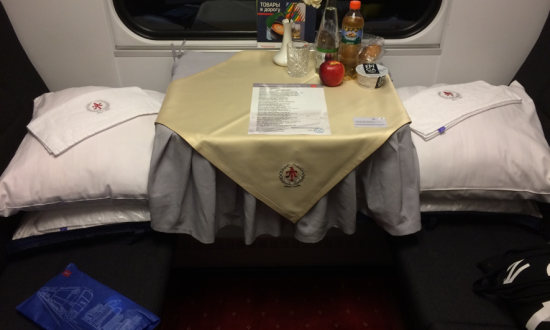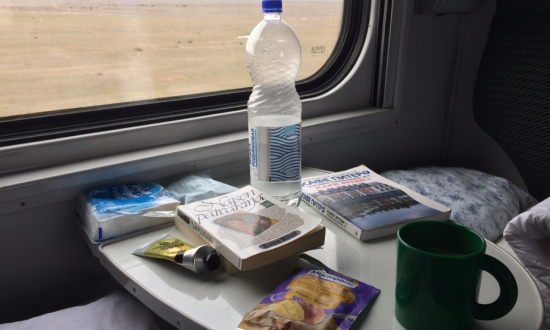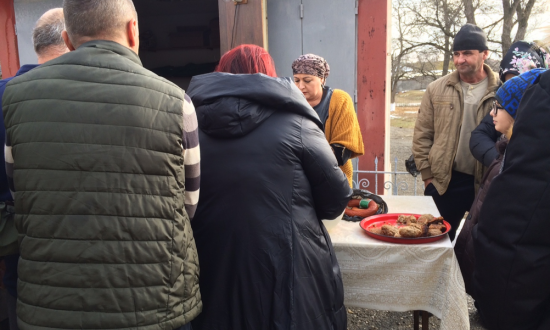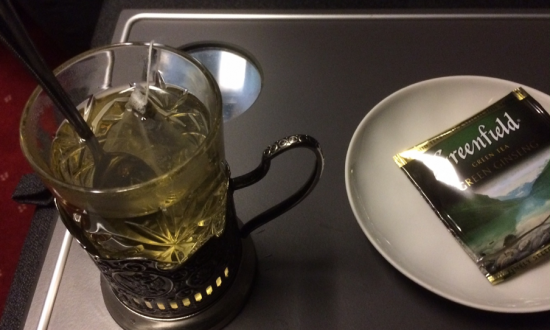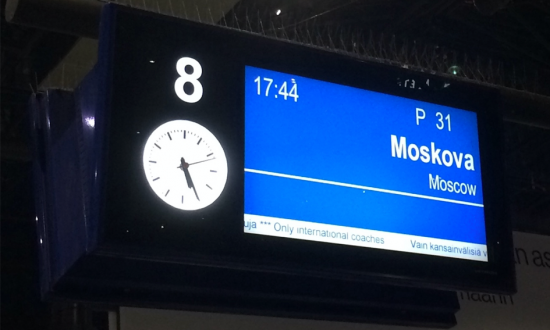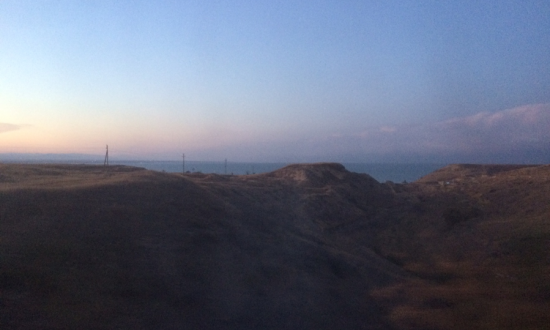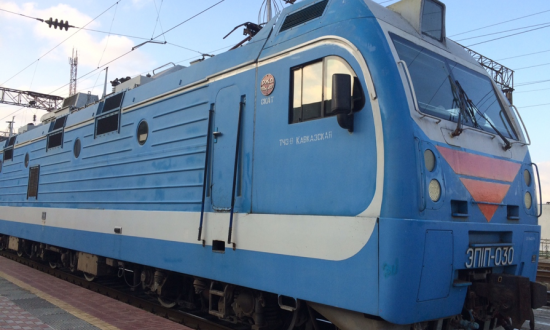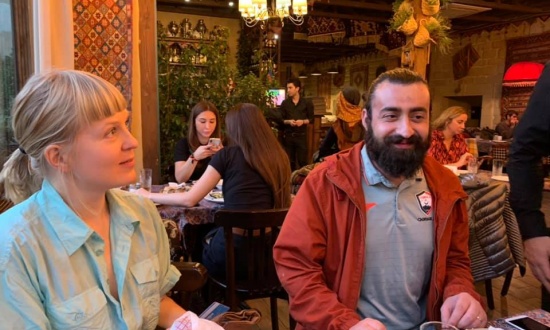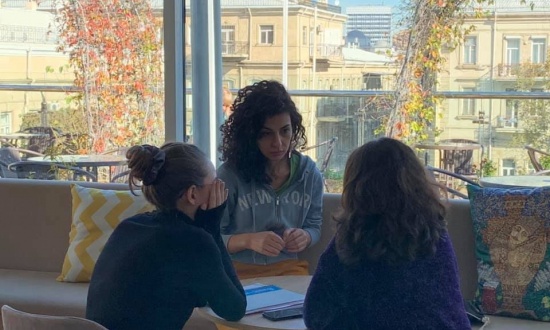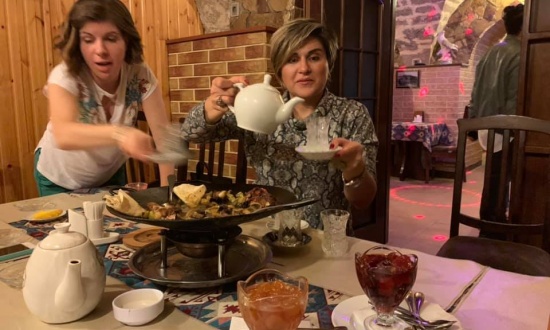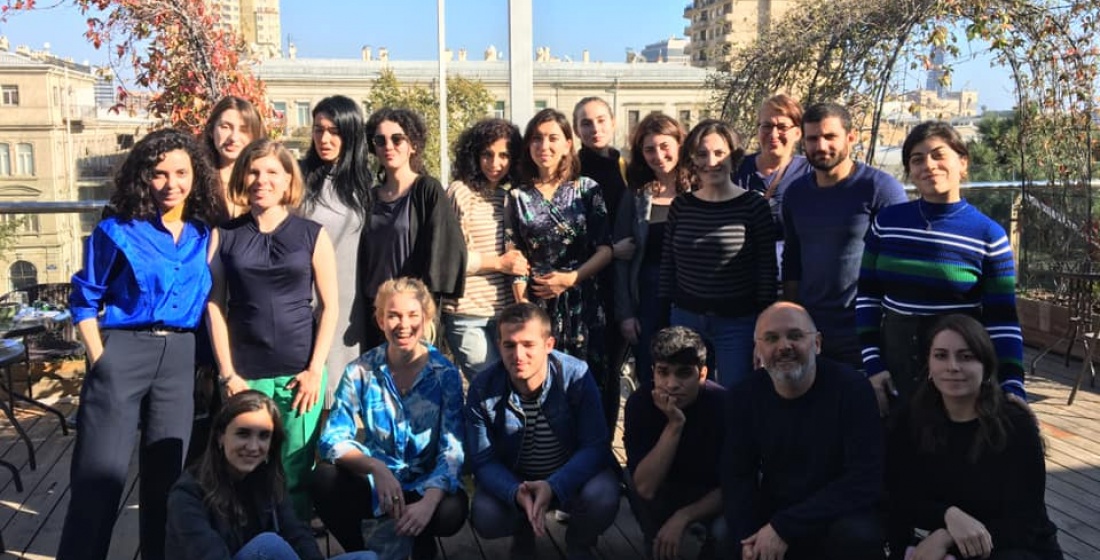
Doc Lounge Caucasus in Baku, Azerbaijan - Travel blog by Jaana Eskola (DL Helsinki)
This November we co-organised the last of the four workshops in the project Doc Lounge Caucasus supporetd by Swedish Institute and the first one in Baku, Azerbaijan. The 5-day workshop took place at the same time as the Baku International filmfestival and included sessions on project management, audience development and budgeting for film screenings and events. Doc Lounge Director Maja Lindquist was there together with the Project Manager from Doc Lounge Helsinki, Jaana Eskola. As a part of Doc Lounge work for enviromental sustainability, Jaana choose to travel by train. Read more about her experience from the workshop and her excitiing train trip Helsinki-Baku in the blog posts below.
The Doc Lounge workshop in Baku, 5-9 November, 2019 by Jaana Eskola
Doc Lounge Caucacus project continued in 5-9 November, 2019 in Baku, Azerbaijan with a five-day training for local coordinators How to Organize Regional Screenings? I had a chance to participate in the training as a member of Doc Lounge Network and coordinator of Doc Lounge Helsinki and I presented a case study of one Doc Lounge event organized in Helsinki as part of Nordic Doc Lounge network. Participants of the training came from Azerbaijan, Georgia and Russia with various backgrounds from filmmaking to event coordination and journalism. The training week gave its participants throughout knowledge of the basics of film festival producing, planning, marketing and implementing added with very useful networking and information acquiring skills. One of most valuable lesson taught was still the cultural sharing and learning from each other during the week. I was utterly impressed by the depth of the projects planned and professionalism and inspiration of the participants: they all had a desire to make an impact in their societies and use documentary films in making change in their societies and in people’s lives. This was healthy reminder of the power of documentary filmmaking and its potential, and definitely something I took home with me after returning from Baku. The value of this project is obvious: you can’t understand culture, politics, conflict, identity and the importance of one’s own language without meeting people and discussing about their lives in person.
It was great meeting the colleagues from CinéDOC Tbilisi and from the Caucasian house and get an introduction to Azerbaijani film making scene as well and visit the Baku International Short Film Festival. Many thanks to the organizers of the workshop and of the festival!
The week in Baku was also an excellent opportunity to get a short introduction to Azerbaijani culture and cuisine and history. I absolutely loved it, çox sağolun!
Travel Blog Helsinki- Baku by Jaana Eskola
Flying contributes about 2% of the world's global carbon emissions and is one of the significant contributors to our personal carbon footprint. When I received an invitation to join Doc Lounge Caucasus training organized in Baku, I wanted to look for alternative ways of travelling there. Thanks to Doc Lounge, who were very supporting in facilitating my quest for slower travelling, I travelled from Helsinki to Baku mainly by train. This is a short summary of my experiences with some evaluation whether travelling for work by train is really a viable option.
ROUTE:
1.-2.11.2019 Helsinki-Moscow: night train, 14 hrs
2.-5.11.2019 Moscow-Baku: night train, 55 hrs
9.11.2019 Baku-Moscow: plane, 3 hrs
10.-11.11.2019 Moscow-Helsinki: night train, 14 hrs
Total CO2 emissions: 524,70kg
To compare: CO2 emissions of return economy flight Helsinki-Baku-Helsinki (via Kiev): 1100,00 kg
Friday 1 November, 2019
Helsinki-Moscow / VR Tolstoi
Electric train: CO2 emissions 37,8 kg (source: ecopassenger.org)
Price: 98,44€ (2nd class)
Tolstoi, the night train service between Helsinki and Moscow, departs from Helsinki Railway station at 17:44 on Friday 1 November. Already at the first sight Tolstoi is different from ultramodern and sleek high-speed Allegro trains that run between Helsinki and St. Petersburg. Tolstoi is modern but has a lot of character, it’s train travel with charm. You are greeted on the platform by train stewardess who checks me in and guides me to my comfortable and well-lighted compartment in a second-class carriage.
I am sharing the cabin with two Russian women who are travelling to Saint-Petersburg. Soon after the departure you are brought the tea of your choice and some apple crepes. Towels and table cloth are embroidered with Russian Railways logo. There is a restaurant car in the train, with a full menu of Russian food and drinks. All is very comfortable, and well worth the value. Border control is cleared around 21.30 in the evening and after that you can have almost uninterrupted sleep until you arrive in Moscow Leningradsky station at 9.30 in the morning. Travelling whilst sleeping well, there’s no better way of getting from Helsinki to Moscow.
Night trains to Moscow depart from Helsinki Central Railway station once a day, six days per week.
Saturday 2 November, 2019
Moscow-Baku / Azerbaijan railways ADY, Route no. 055Ч, Moskva Kur — Baku-Pass
Diesel locomotive: CO2 emissions 92,1 kg (estimate according to ecopassenger.org)
Price: 280,61€ (1st class)
Moscow-Baku train, the second leg of the journey, is the longest totaling of 55 hours. The train has big and heavy diesel locomotive, which means it emits significantly more CO2 than electric trains. Nevertheless, a journey by diesel train still produces 84 per cent less carbon than flying.
The train has altogether 13 carriages, out of which most are third-class carriages: open wagons divided in compartments of 6 beds, 3 bottom and 3 top bunks. There are also second-class carriages (compartments of 4 beds) and one first-class carriage at the end of the train. As I am travelling this route for the first time and I am travelling alone, I have bought a first-class ticket, which can easily double the price of the second class ticket. Otherwise, all carriages are pretty much same: there is a toilet at the other end of the car, samovar and small kitchen corner at the other end.
Train departs at 22:44 from Moskva Kurskaja station, so straight after our train host brings me ADY logo bed sheets, I made my bed and go to sleep, or try to. The night is noisy and full of stops in different stations and the trains are very, very warm so sleeping is hard. Beds are comfortable though. And the benefit of travelling first class is that I ended up having the entire small cabin for myself.
Sunday 3 November, 2019
Travelling through Russia
Landscape since leaving Moscow has stayed was pretty much the same: fields, bushes and some more fields but the towns we are passing are getting smaller and different all the time.
Travelling by train is soothing: it’s slow but you are constantly on the move. The cabins have sockets so you can work well in the train. Also roaming in Russia is not overly expensive if you get yourself a wi-fi package. The train doesn’t make much stops so there is not much else to do than read, work and sleep, which is relaxing. In every carriage, there is a big samovar with endless supply of hot water and a small ceramic pot of strong, black Azerbaijan tea. When travelling by train in Russia and in Azerbaijan, remember to bring your own cup!
One thing to learn when travelling in Russia by train: Russian trains mostly have a restaurant with full menu and the ticket price also includes some service in your own compartment. Azerbaijan trains do not. Remember to bring your own food along! The train makes some longer stops along the route, and that is when everyone gets out to buy some water, instant noodle, soup and chocolate and juice from the kiosks on the platform. During the stops, platform gets crowded, of mostly men, travelling in 3rd class shared bunk bed compartments. There are some families with kids as well and some older couples but the majority of people travelling on the train are young men.
Monday 4 November, 2019
I get up in the morning at 9.30, when the heat in the cabin is getting beyond limits and I need to get some fresh air. There’s no shower in the train, but I splash some cold water on my face in the toilet and go to get myself a cup of strong, good azercay (I have learned the correct way to mix it: pour about 1/3 of the strong tea from little teapot in your cup and fill it up with hot water). To plan the day, I try to make sense of the actual time to figure out when will our next longer stop be. There is a printed timetable framed on the wall in the train but we are travelling between timezones all the time and my phone without wi-fi access does not really keep up with the real time so it’s all a bit fuzzy.
First longer stop of the day is in Artezian, small town between Volgograd and Makhachkala. On the platform, there are women selling homemade pirogis, meat, fruit, water and other train travel food and people are crowding around them to fill up their storage. There are cows roaming free next to the train tracks eating dried grass and seem quite accustomed to the noise of the train. Landscape is still very flat: grey fields in all directions. We are supposed to arrive to Caspian seashore this afternoon, and the journey continues along the sea line from here.
Makhachkala 15:25
The train makes a longer trip in Makhachkala which gives me a chance to wonder around the surroundings of the railway station for 20 minutes. Honey, instant meals for train travel, cooking oil in big canisters, slippers, candies in 2 kg bags, these seem to be main articles on sale on the platform. Landscape before Makhachkala is made of mountains on the right side and amazing Caspian seashore on the left.
Between Makhachkala and Derbant the sun starts to set and the landscape changes visibly: mountains on the right are getting bigger and bigger and lush lands have changed into brown fields again. Colours here are beautiful: the sun is definitely different from what it is on northern countries at this time of the year.
The train makes only short stops on the way, but you can get anything you possibly could need for train travel from the platform.
Russian – Azerbaijan border: Derbent (Russia) // Yamal (Azerbaijan) 18:22-22:12
Border controls are very throughout on both sides of the border. Russian officials were questioning my motivation to travel to Baku by train and I had to explain several times where I started and where I was heading to. Despite the throughout checks, that keep us altogether four hours at the border, accessing Azerbaijan is easy. Getting an e-visa for 30 days is easy, inexpensive and works well. You can get it online in a couple days and it costs you around 21 euros.
Upon arrival, I notice that after more than two days in a train, my cabin has become a very comfortable place, a mobile home. For work trip, choosing a first-class carriage was a wise thing to do, as it gives you space and solitude when you need it and if you are lucky, you might end up having the cabin all for yourself.
Saturday 9 November, 2019
Baku-Moscow / Aeroflot
Flight: CO2 emissions 357 kg (source: co2.myclimate.org)
Price: 266,01€
Doing the entire trip via land turned out to be difficult, as there is only one train per week operating between Baku-Moscow and going back by train would have prolonged the trip with almost one week. This was the tipping point of my planning: few extra days on a work-related trip would not have been a problem, but spending a one full week on the route turned out to be impossible.
Nevertheless, it was a great opportunity to compare flying to train traveling and their benefits. Time spent on security checks, moving to and from the airport (which is more than one hour in Moscow!) is tiring, while train takes you from city center to city center, with very fast and light security checks and almost no queuing. Three hours in a plane versus three days in the train is undoubtedly faster, but the CO2 footprint of flying is almost four times bigger than CO2 emissions of the train. With modern electric trains train travelling would be even more competitive to flying, if the travel time could be cut to less than two days. Unfortunately investing in Moscow-Baku connection might not be in sight in close future, hence flying probably remains the number one option for almost everyone.
Sunday 10 November, 2019
Moscow-Helsinki / VR Tolstoi
Electric train: CO2 emissions 37,8 kg (source: ecopassenger.org)
Price: 116,04€ (first class)
After two days in Moscow, I return to Helsinki with Tolstoi again, this time in first-class cabin which you can get for a fair price if you book early. It is hard to think of more comfortable way of traveling than taking a Russian over-night train. Compared to plane, train travelling saves you from hideous travel to and from airport and takes you directly from city center to city center. Russian trains are comfortable, very clean and everything runs very smoothly. Trains have a shower, restaurant and wi-fi (although wi-fi didn’t work most of the time) so you can work efficiently in your private cabin and have good sleep before arrival. Definitely recommended!
Some reflections after the trip
Worth it? Definitely.
Working in a train? Very easy, and as there is not much else to do, you actually get to focus really well, often even better than in your own office.
Sleeping? Beds and cabins are comfortable, especially in modern Russian trains, where the cabins have air-conditioning and wide beds.
Eating in a train? Varies. Russian trains offer you wider selection of food and a proper restaurant car, for Azeri trains you should remember to pack your own food!
Other benefits? Slow travelling and watching the scenery passing by through the window is very meditating and forces you to calm down. You meet new people (if you want), and temporary shut-off from internet is definitely a positive thing and enables you to focus, think and read.
Although travelling via land takes much more time than flying, travel days can be efficiently used for working. However, in order to make ecological traveling accessible to everyone, a change in working culture is needed. Possibility to travel via land should be embedded in the organizational culture and employees should be encouraged to choose more ecological ways of travelling and be allowed to include the travel time as their working time. Only by changing the organizational culture we can make ecological traveling a standard and competitive option for flying.
The environmental benefits of choosing train instead of flying are clear: traveling via land reduced my CO2 emissions to 47,4% of what it would have been by doing the entire trip by airplane. Compared to economy return flight Helsinki-Baku-Helsinki (via Kiev), taking a train instead reduced CO2 emissions by 575,30 kg.
Choosing train traveling even wherever possible can significantly help us in reducing our CO2 footprint and the train travelling sector is developing very fast. Trains are a choice for the future: they are green, comfortable and convenient.
